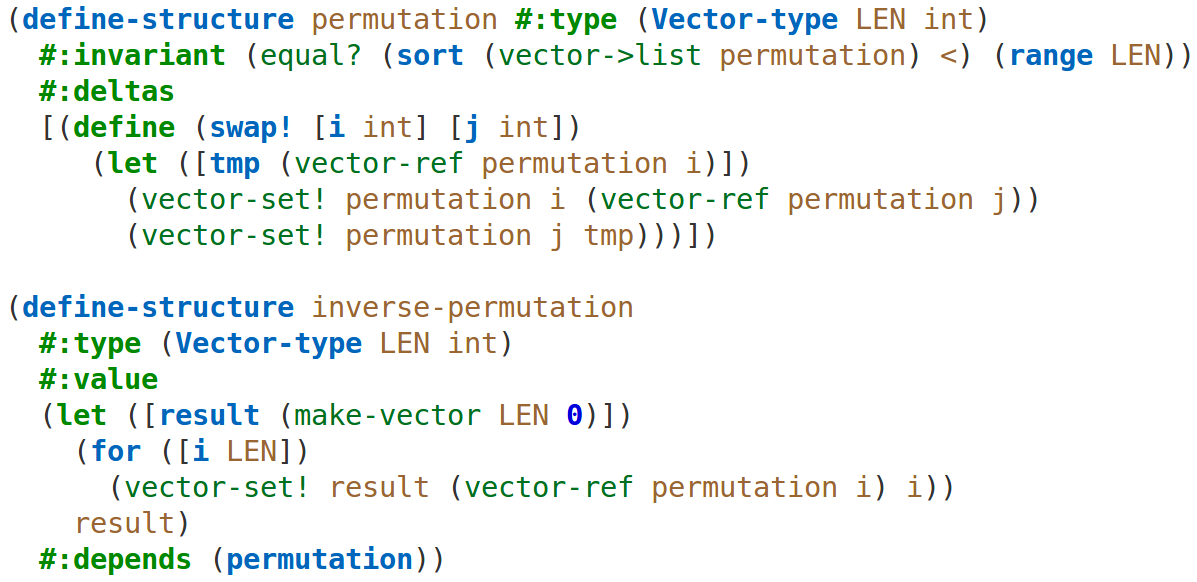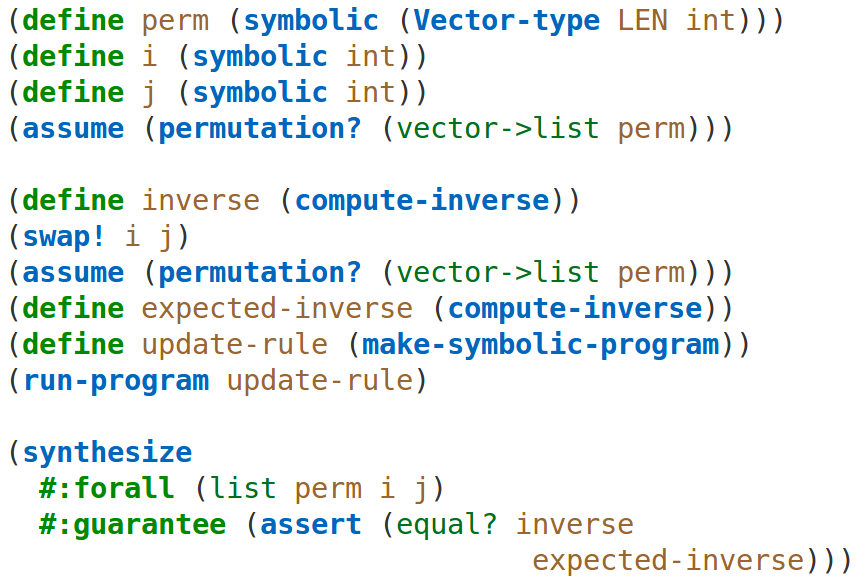Scalable Synthesis with
Symbolic Syntax Graphs
Rohin Shah Sumith Kulal Rastislav Bodik



A simple computation
max (1 2 8 4 3 7 6 5) = 8
Incremental updates
max (1 2 8 4 3 7 6 5) = 8
max (1 2 3 4 3 7 6 5) =
delta
update
Complexity?
Non-incremental - O(n)
Incremental - O(1)

7
Motivation
Incremental - efficient, asymptotically fast
Non-incremental - easier to write
Automatically synthesize incremental updates
Application Domains
- Probabilistic Programming and Machine Learning Research
- Data structures
- Specializing an inference algorithm with respect to a model
- Sampling Algorithms: Loop in which we modify a small part of a “possible world”
- Have many data structures for fast lookup
- Automatically repair data structures when data is changed
Why synthesis?
- Easy to extend to new domains
- Specification is simple, with low annotation burden
- Data structure and delta definitions can be arbitrary Rosette programs
- Highly performant at runtime, comparable to handwritten code
- No dependency analysis at runtime
- Static types for each data structure and delta
Formal specification
P
I
O
O'
I'
Example: Inverse Permutation
3 2 5 7 0 1 4 6
0 1 2 3 4 5 6 7
4 5 1 0 6 2 7 3
0 1 2 3 4 5 6 7
Permutation
Inverse
Updates?
3 2 5 7 0 1 4 6
0 1 2 3 4 5 6 7
4 5 1 0 6 2 7 3
0 1 2 3 4 5 6 7
3 2 5 1 0 7 4 6
0 1 2 3 4 5 6 7
4 5 1 0 6 2 7 3
0 1 2 3 4 5 6 7
P
?
Swap any two elements of the initial sequence
Specification

Solution

- No runtime dependency analysis or other tracking
- Similar to handwritten code
CEGIS
Guesser
Verifier
CEGIS
Guesser
Verifier

perm: [1, 0, 2, 3] i: 0 j: 1
CEGIS
Guesser
Verifier

perm: [3, 1, 0, 2] i: 2 j: 1
CEGIS
Guesser
Verifier


Symbolic grammar
Statement
Integer
inverse
vector-set!
constant
Integer
Integer
word->text
i
Vector
Vector
perm
Integer
Integer
vector-ref
+
*
vector-inc!
vector-dec!
j
word->text
Implementation: Rosette
- Rosette extends a subset of Racket with constructs for using a solver (Z3)
- Symbolic values allow us to represent a set of values
- We can use symbolic values like regular values and make assertions
Algorithm

How do we scale?
- Type analysis – only generate well-typed programs
- Sharing of subtrees where possible
> Needed for correctness, else you could just undo the delta
> Greatly reduces the search space
- Mutability analysis – don’t mutate some of the values
- Use temporary variables to reduce search space size, without losing the type analysis
Results
| Search space size | |||||
| Solution size | 3 8 10 | 10 20 12 | 12 | 17 | 23 |
| Solver time (s) | 3 4 30 | 122 89 96 | 62 | 7 | 75 |
| Total runtime (s) | 44 | 124 91 98 | 64 | 12 | 80 |
| Perm | LDA | MB |
| Set Updates | Grades |
|---|---|
| Add Remove Size | Assign Swap Struct |
Related work
- Self-Adjusting Computation
- Static Approaches
> Build a dynamic dependence graph, incrementalize using change propagation
> Recent work done in Adapton
> For a particular subset of programs, statically transform the program to get a new, incremental version
> Incremental view maintenance (databases), object oriented programming, Datalog, invariant checkers, etc.
Future work
- Improve scalability - try new encodings
- Synthesis of auxiliary data-structures
- Explore new application domains
Go here
Thank you all!

@sumith1896





Symbolic grammar
Statement
n-topic-text
new-topic
Integer
Topic
vector-set!
constant
vector-ref
Integer
Word
word->text
word
Vector
Vector
Vector
Integer
Integer
vector-ref
+
*
vector-inc!
vector-dec!
old-topic